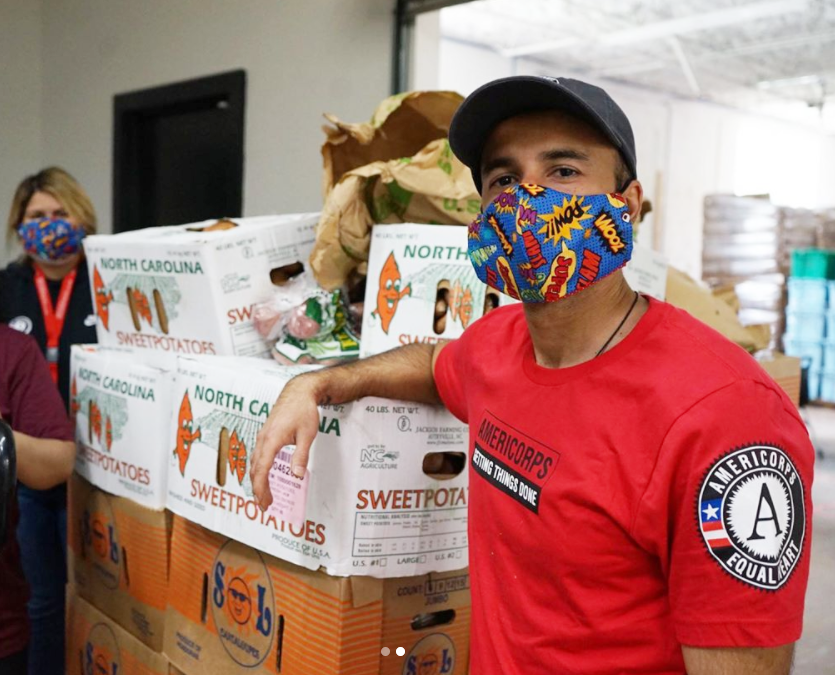Schultz Family Foundation Deepens Commitment to National Service as a Pathway of Opportunity for Young People
Invests $3.5 Million in Seven U.S. States, Unlocks $5.1 million in Additional Funding from Other Philanthropies
November 8, 2021

The Schultz Family Foundation, founded by Sheri Schultz and former Starbucks ceo and chairman emeritus Howard Schultz, today announced recipients of its National Service Challenge to support national service as a pathway of opportunity for young people, especially people of color and young adults from low-income households.
Recognizing the role of philanthropy as an innovation partner to the public sector, the Foundation launched the National Service Challenge in May 2021 to offer matching grants of $100,000 to $250,000 to state service commissions partnering with philanthropy to increase diversity of AmeriCorps, to make service a pathway of opportunity for all young people, and to offer support and mentorship during and after their service. As a result of the Challenge, the Schultz Family Foundation is investing $3.5 million in seven U.S. states: Iowa, Michigan, Minnesota, Pennsylvania, South Carolina, Texas, and Washington. The Foundation’s investments will be supplemented by $5.1 million in matching grants from other philanthropic partners, which the Challenge helped to unlock.
The Challenge builds upon the Foundation’s learnings and impact over the past year in developing the Washington COVID Response Corps, a first-of-its-kind youth service program created in partnership with Serve Washington to respond to record levels of community need resulting from the COVID-19 crisis while expanding meaningful opportunities to young people whose lives were disrupted by the pandemic. In its second year, the program is being expanded to address community needs in addition to food insecurity such as mental health, workforce development, and mentoring for middle school students in support of foster youth.
Challenge grants will support the seven states in the following ways:
- Iowa: Volunteer Iowa and its key partner, Refugee RISE AmeriCorps, will pursue a set of initiatives designed to make Iowa AmeriCorps programs more accessible to those from low socioeconomic status, increase member professional development, make Iowa service sites more welcoming of members from diverse backgrounds, and prepare more BIPOC-led and rural non-profits to engage with national service.
- Michigan: Michigan Community Service Commission (MCSC) will focus the core of its work on increasing the recruitment and retention of youth AmeriCorps members of color. MCSC will pilot a pre-service basic needs assessment with incoming members to identify barriers to successfully completing a service year. Individuals with identified barriers will receive financial support and connection with community organizations to mitigate challenges.
- Minnesota: In addition to establishing an emergency assistance fund for AmeriCorps members across the state, ServeMinnesota will pilot the Pathways to Economic Inclusion Through AmeriCorps initiative, which will provide 20 AmeriCorps members with the opportunity to earn an Associate in Arts (AA) degree tuition-free; an increased living stipend; assistance from a resource navigation specialist; professional development opportunities; and a “last dollar” fund to cover additional or unforeseen costs associated with earning their AA degree.
- Pennsylvania: PennSERVE will take a multi-pronged approach to increasing recruitment, retention, and outcomes for BIPOC and/or low-income youth AmeriCorps members by: 1) piloting a cross-program initiative and shared on-the-ground recruiter to build a service to city government career pathway; 2) launching an emergency assistance fund; and 3) creating a learning community among programs to share innovations and work around increasing diversity and equity.
- South Carolina: The South Carolina Service Commission will build on its multifaceted strategy to expand service and advance equity within the state by focusing on recruitment and retention. The Commission will work alongside Historically Black Colleges and Universities (HBCUs), service clubs, and other key community leaders to raise awareness of available service opportunities through AmeriCorps, focusing specifically on recruiting and enrolling youth and young men of color. To better support AmeriCorps Members during their year of service, the Commission will expand its emergency assistance fund, which was piloted in 2020. In the pilot year 100% of AmeriCorps Members who benefitted from the fund graduated from their service terms rather than having to make a difficult financial decision to withdraw from their term of service to afford the cost of an emergent need.
- Texas: OneStar Foundation (a.k.a. Texas State Service Commission) will build on work piloted by AmeriCorps Central Texas (ACT), a unique collaborative of nine AmeriCorps grantees that came together to develop new recruitment strategies focused on engaging young people within their local communities to serve. OneStar Foundation will take the effective practices identified by ACT and scale the strategies statewide while continuing to support ACT’s innovative approach to place-based recruitment. In addition, OneStar will be investing in professional development resources and trainings for AmeriCorps members statewide focused on supporting their post-service career path.
- Washington: Through a partnership with Serve Washington, the Foundation will fund a second year of the Washington Covid Response Corps, expanding the focus of the corps beyond food insecurity to additional community needs such as mental health, economic development, and learning loss among elementary school students. The Response Corps will also continue its work in developing national service as a pathway to opportunity for all young people in Washington state through additional member development training focused on supporting each member’s post-service career path and providing training that results in the form of an earned credential.
All seven states will participate in a learning collaborative facilitated by America’s Service Commissions to share insights and best practices, which will result in research that will be shared with every state service commission across the country.


